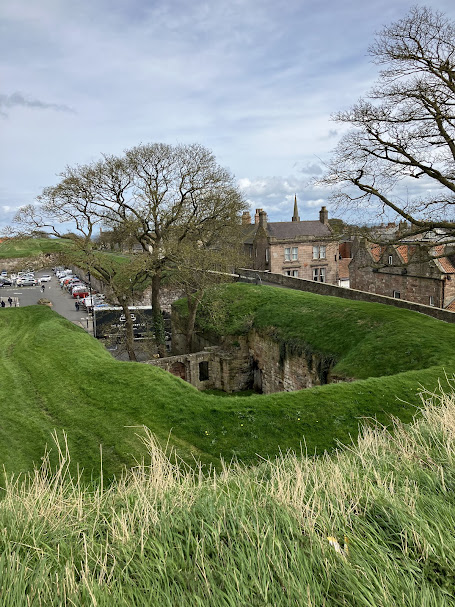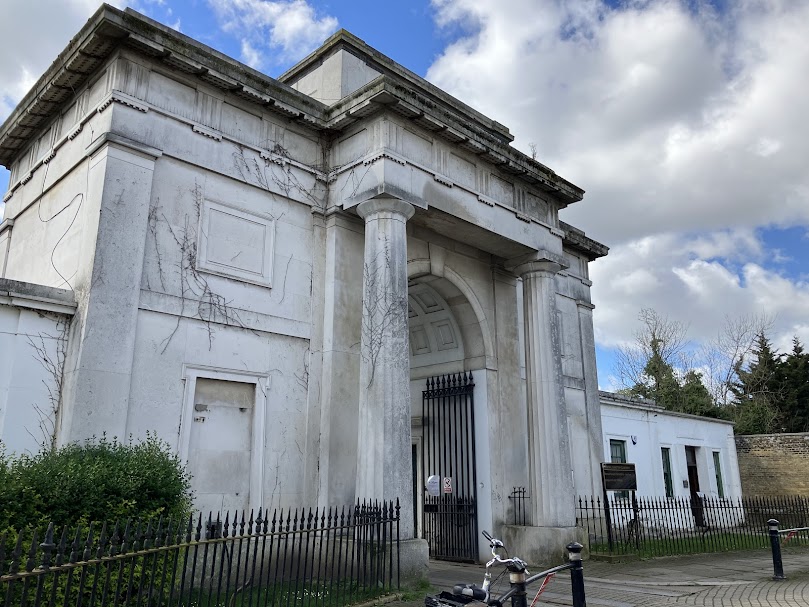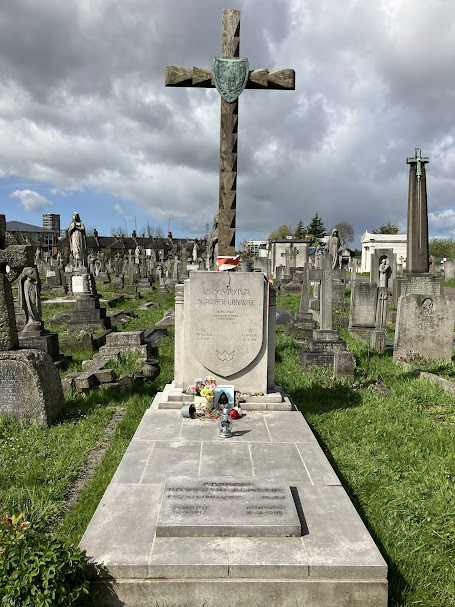9. A Spring in Britain: A Concert and A Cemetery
When we were last together, I had said farewell to Lindisfarne after being in the unlikely position of reassuring native Britons at the bus stop that there was indeed a real bus that arrived on Holy Island regularly, if not often.
Once back in Berwick, I checked into the Castle Hotel, not the Castle Vale House, which I had enjoyed so thoroughly a week earlier. It should be said at once that there is no castle. There used to be a castle but apparently the train station was built on its former location and everything within spitting distance is now named Castle Something.
The Castle Hotel was serviceable and the staff was lovely. I was only there because I decided at my advanced age that I had had enough of hurling myself from one destination to another, at the mercy of late trains, flash floods, train strikes and being fatigued. So I gave myself an extra day in Berwick to walk in some of the glorious parks and to go to an evening concert I had seen advertised on a poster.
The concert was called “All in the April Evening,” a reference to a weird poem by Katharine Tynon set to music by Hugh Roberton and well known in the church choir set a generation ago. Marion Scammell directed a community choir and orchestra in Vivaldi’s Gloria, Schubert’s Mass in G and Elgar’s “Songs from the Bavarian Highlands” in the Berwick Parish Church, the Cromwellian building where I had, a week prior, asked to use the toilet and then felt obliged to attend mass because the vicar was so nice.

Berwick town walls
I arrived at the concert, having walked over on the old town walls, and found that I needed cash, which I did not have. There was a time when I bought pound sterling before I got on the plane in Seattle and then got more at an ATM in Heathrow. Now everything is contactless. Except amateur musical societies.
British to the core, Reception was apologetic for asking a fee at all and outraged at their own thoughtlessness in not being able to accommodate credit cards.
“We really need to pull ourselves into the 21st century. But do come in. We are not going to turn you away!”
(I sent a donation when I got home and Andrew doubled it. I love having a boyfriend.)
I sat in the balcony until the intermission –when we all repaired across the way to a social hall for wine– and then moved down to the front, near enough to see the drama behind the performance. I thoroughly enjoyed the concert. I like a well-rehearsed professional choir as much as anyone but there is nothing quite so magical and refreshing than listening to regular people making music for the pure joy of it. I enjoyed not being responsible for any of it.
And then it was the next day and I was on the train to London where it was warm and summery. I got in a taxi queue and then sank back for the ride to Queensway where I had booked a room at Hyde Park International Hotel, two blocks from the park. Not an expensive hotel, there still was a smiling doorman and wonderful staff and lovely rooms with a view of a quintessential London street with two story white rowhouses, quaint iron gates and big leafy trees. I went for a long walk in Kensington Gardens and then to bed early.
Monday the rain and cold was back. I went to Kensal Green Cemetery, my mission the grave of one Krystyna Skarbeck aka Christine Granville, Polish-British spy. A rain squall drove me into a Costas where I dried out with a cappuccino and wrote four postcards I had been carrying around from Holy Island.

entrance to Kensal Green cemetery
When the rain let up, I started walking, looking at my map and asking questions until I got on the correct bus. The driver put me down at a wall on the Harrow Road and told me the cemetery was on the other side.
Kensal Green is an enormous cemetery crammed with monuments and headstones bending every which way, long grass dressing everything up. It would be a nightmare to trim, which is probably why they don’t. I walked along one of the main roads for what felt like miles, following signs to the chapel and crematorium, figuring that would be the most likely place to get some directions to the St Mary’s section of the cemetery I was looking for. I finally found a foreman who told me I was in the wrong cemetery! St Mary’s used to be part of Kensal Green but now has a separate entrance. So I went out and the far end and around a corner to get into St Mary’s.

There wasn’t a soul (least not a live one) in sight but fortunately I had done enough homework that I knew the quadrant and number of the grave. But the quadrant was enormous and it’s not like the grave numbers are prominently displayed like house numbers. I wandered around and backtracked, musing that I had worn the wrong shoes and how on earth did I expect to find this grave and what was wrong with me that I even wanted to. Couldn’t I just go to the Tower of London or Madame Tussauds like everyone else?
Picking my way through grass and graves, I suddenly just saw it. It was like when Sue and Wendy and I were wandering the harbour of Tobermory, hoping to see the cat, Ledaig and Sue suddenly crying “There it is!”
Clearly, I was not the only pilgrim to this grave. Krystyna has not been forgotten. There was a sash –maybe a French resistance thing—flowers, rocks, a photo, a candle. I stood for a long time, got tears in eyes and finally turned to backtrack all the way to the bus.

Krystyna Skarbeck
On my way, I saw a man about my age at a small grave.
“I never bring the right tools,” he commented when he saw me.
“You’re tending a grave. Is it a parent?”
“No, it’s my son.”
Simon, aged 8, had died in 1981 of leukemia on that day, April 15.
“I’m so sorry,” I said
“You never get over the guilt of being left alive.”
I started to choke up.
“Never mind,” he said. “That’s life. Who are you visiting?”
“A spy.”
We had a nice chat about spies, World War II, American sports (briefly as I know nothing about them. He liked the Dallas cowboys, yawn) and our political scene.
“Bless your little boy,” I said– I don’t know why; I wanted to say something—and continued on.
By the time I was getting some fish and chips in Notting Hill, I couldn’t feel my feet. I had walked six miles in the wrong shoes. It had been a strange but lovely day.
 RSS Feed
RSS Feed
Leave a Reply